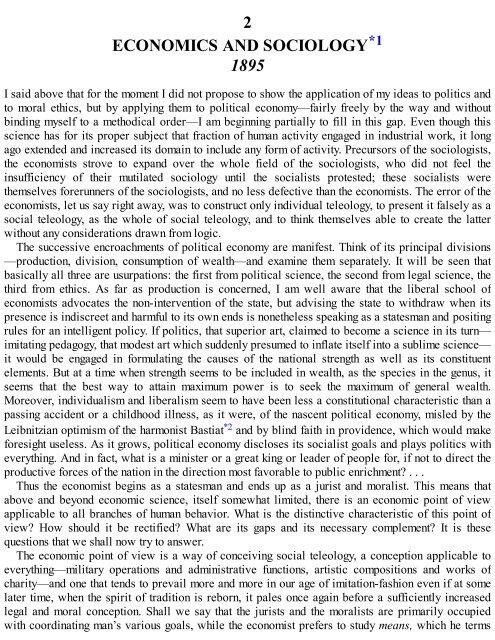3658925934
You also want an ePaper? Increase the reach of your titles
YUMPU automatically turns print PDFs into web optimized ePapers that Google loves.
2<br />
ECONOMICS AND SOCIOLOGY *1<br />
1895<br />
I said above that for the moment I did not propose to show the application of my ideas to politics and<br />
to moral ethics, but by applying them to political economy—fairly freely by the way and without<br />
binding myself to a methodical order—I am beginning partially to fill in this gap. Even though this<br />
science has for its proper subject that fraction of human activity engaged in industrial work, it long<br />
ago extended and increased its domain to include any form of activity. Precursors of the sociologists,<br />
the economists strove to expand over the whole field of the sociologists, who did not feel the<br />
insufficiency of their mutilated sociology until the socialists protested; these socialists were<br />
themselves forerunners of the sociologists, and no less defective than the economists. The error of the<br />
economists, let us say right away, was to construct only individual teleology, to present it falsely as a<br />
social teleology, as the whole of social teleology, and to think themselves able to create the latter<br />
without any considerations drawn from logic.<br />
The successive encroachments of political economy are manifest. Think of its principal divisions<br />
—production, division, consumption of wealth—and examine them separately. It will be seen that<br />
basically all three are usurpations: the first from political science, the second from legal science, the<br />
third from ethics. As far as production is concerned, I am well aware that the liberal school of<br />
economists advocates the non-intervention of the state, but advising the state to withdraw when its<br />
presence is indiscreet and harmful to its own ends is nonetheless speaking as a statesman and positing<br />
rules for an intelligent policy. If politics, that superior art, claimed to become a science in its turn—<br />
imitating pedagogy, that modest art which suddenly presumed to inflate itself into a sublime science—<br />
it would be engaged in formulating the causes of the national strength as well as its constituent<br />
elements. But at a time when strength seems to be included in wealth, as the species in the genus, it<br />
seems that the best way to attain maximum power is to seek the maximum of general wealth.<br />
Moreover, individualism and liberalism seem to have been less a constitutional characteristic than a<br />
passing accident or a childhood illness, as it were, of the nascent political economy, misled by the<br />
Leibnitzian optimism of the harmonist Bastiat *2 and by blind faith in providence, which would make<br />
foresight useless. As it grows, political economy discloses its socialist goals and plays politics with<br />
everything. And in fact, what is a minister or a great king or leader of people for, if not to direct the<br />
productive forces of the nation in the direction most favorable to public enrichment? . . .<br />
Thus the economist begins as a statesman and ends up as a jurist and moralist. This means that<br />
above and beyond economic science, itself somewhat limited, there is an economic point of view<br />
applicable to all branches of human behavior. What is the distinctive characteristic of this point of<br />
view? How should it be rectified? What are its gaps and its necessary complement? It is these<br />
questions that we shall now try to answer.<br />
The economic point of view is a way of conceiving social teleology, a conception applicable to<br />
everything—military operations and administrative functions, artistic compositions and works of<br />
charity—and one that tends to prevail more and more in our age of imitation-fashion even if at some<br />
later time, when the spirit of tradition is reborn, it pales once again before a sufficiently increased<br />
legal and moral conception. Shall we say that the jurists and the moralists are primarily occupied<br />
with coordinating man’s various goals, while the economist prefers to study means, which he terms









![Genki - An Integrated Course in Elementary Japanese II [Second Edition] (2011), WITH PDF BOOKMARKS!](https://img.yumpu.com/58322134/1/180x260/genki-an-integrated-course-in-elementary-japanese-ii-second-edition-2011-with-pdf-bookmarks.jpg?quality=85)
![Genki - An Integrated Course in Elementary Japanese I [Second Edition] (2011), WITH PDF BOOKMARKS!](https://img.yumpu.com/58322120/1/182x260/genki-an-integrated-course-in-elementary-japanese-i-second-edition-2011-with-pdf-bookmarks.jpg?quality=85)





